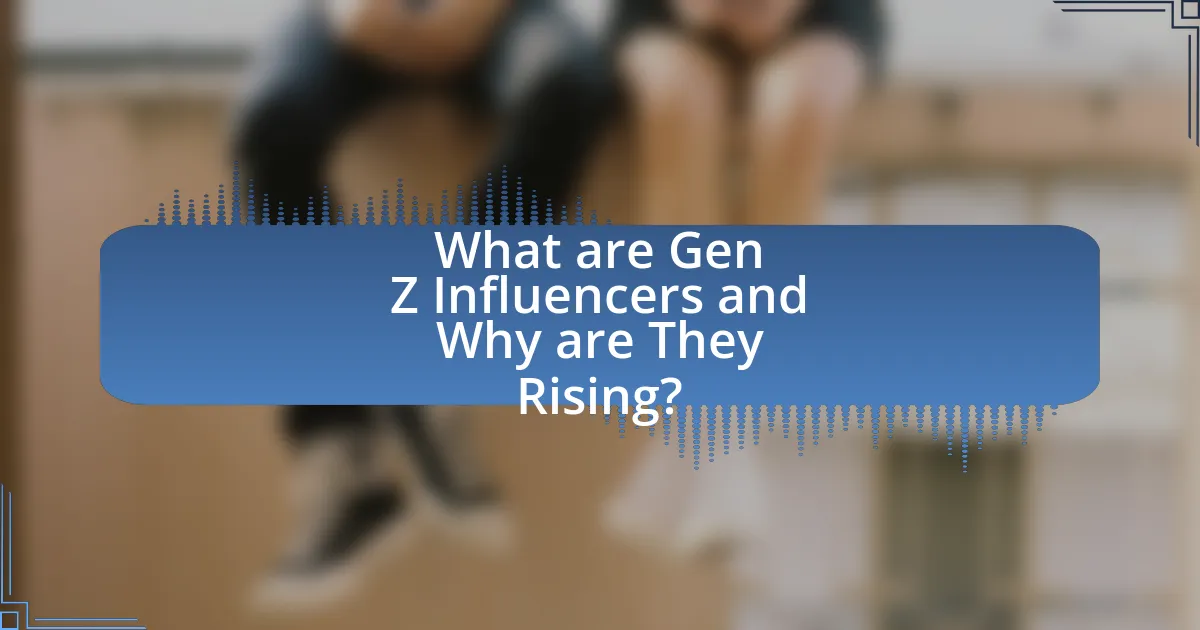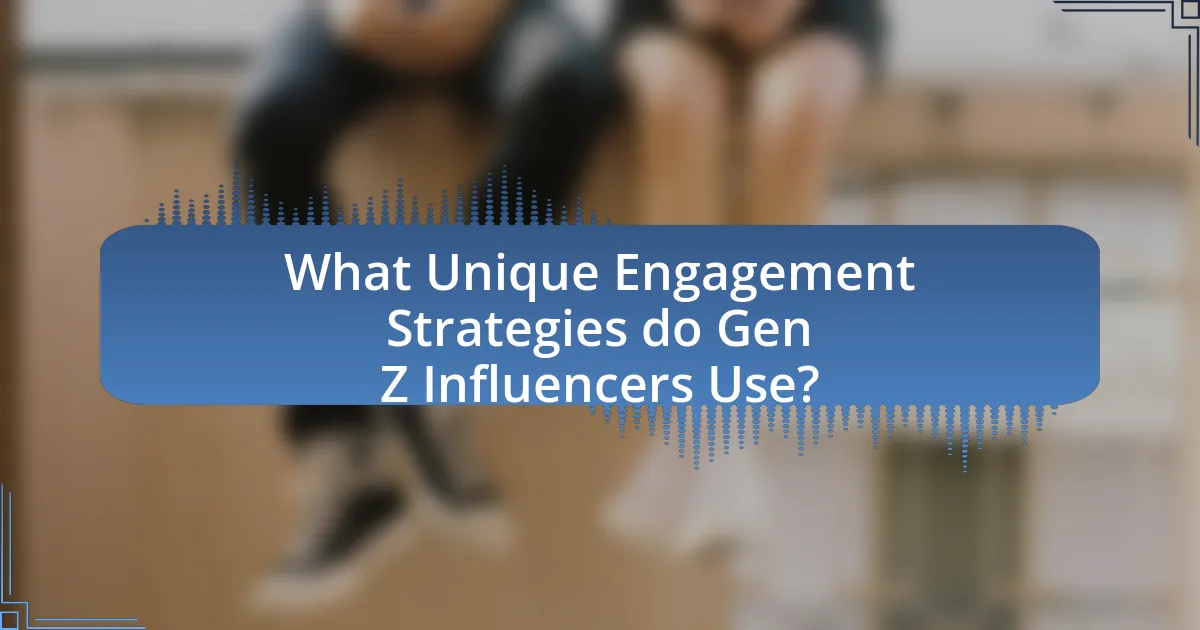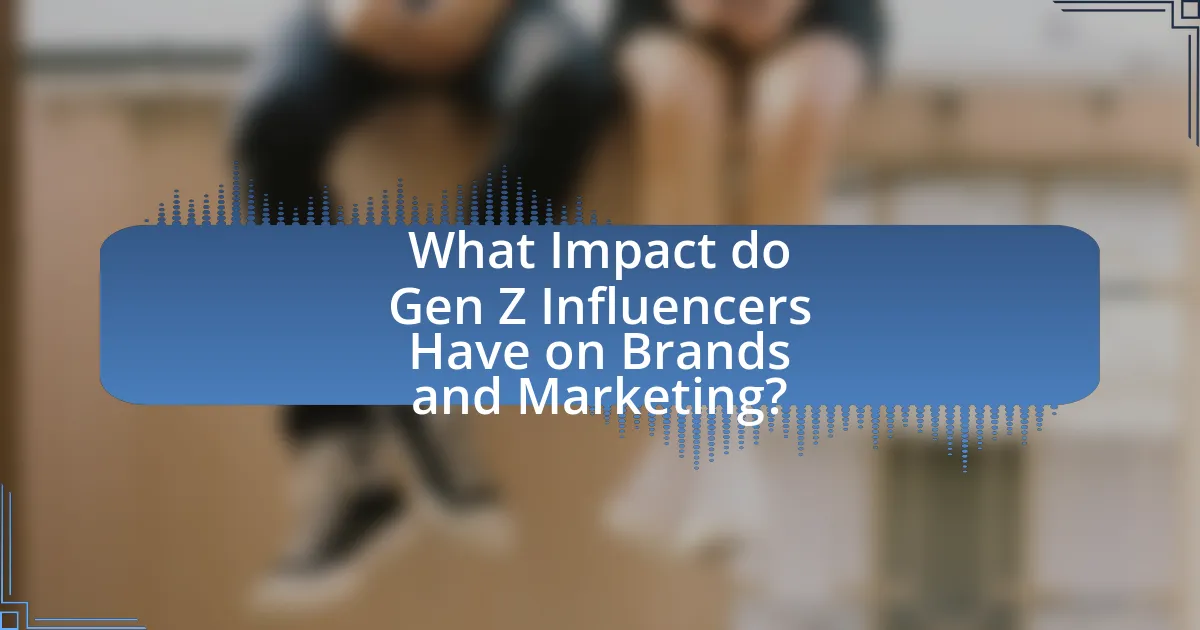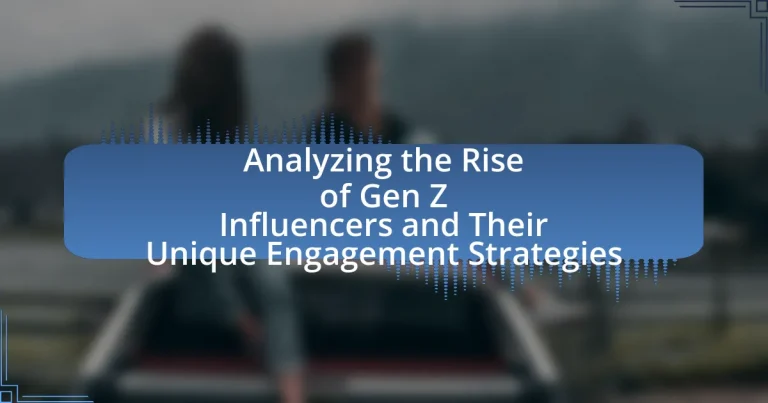Gen Z influencers, individuals born between 1997 and 2012, are rapidly gaining prominence in the digital landscape due to their emphasis on authenticity and relatability. This article analyzes the factors contributing to their rise, including their digital fluency and preference for genuine content over traditional advertising. It explores how Gen Z influencers differ from previous generations, their unique engagement strategies such as storytelling and interactive content, and the significant impact they have on brands and marketing. Additionally, the article addresses the challenges brands face when collaborating with these influencers and outlines best practices for fostering authentic partnerships.

What are Gen Z Influencers and Why are They Rising?
Gen Z influencers are individuals from Generation Z, typically born between 1997 and 2012, who leverage social media platforms to create content and engage with their audience, often focusing on authenticity and relatability. Their rise is attributed to several factors, including the increasing dominance of digital platforms like TikTok and Instagram, where they can easily connect with peers and express their unique perspectives. According to a 2021 report by the Pew Research Center, 95% of teens have access to a smartphone, facilitating their engagement with social media and enabling influencers to reach vast audiences quickly. Additionally, Gen Z’s preference for genuine content over traditional advertising has led brands to collaborate with these influencers to effectively target this demographic, further fueling their popularity.
How do Gen Z influencers differ from previous generations?
Gen Z influencers differ from previous generations primarily in their authenticity and digital-native approach. Unlike Millennials and Gen X, who often relied on polished content and traditional marketing strategies, Gen Z influencers prioritize genuine interactions and relatability, often sharing unfiltered moments and personal stories. This shift is supported by a 2021 survey from the marketing agency YPulse, which found that 70% of Gen Z prefers influencers who are relatable and authentic over those who appear overly curated. Additionally, Gen Z influencers leverage platforms like TikTok and Instagram Reels, which emphasize short, engaging video content, contrasting with the longer-form content favored by earlier generations. This adaptability to new platforms and formats allows them to connect with their audience in real-time, fostering a sense of community and engagement that is distinct from previous influencer marketing trends.
What characteristics define Gen Z influencers?
Gen Z influencers are characterized by their authenticity, digital fluency, and social consciousness. Authenticity is crucial for these influencers, as they prioritize genuine connections with their audience over curated personas, which is evidenced by a 2021 survey indicating that 70% of Gen Z consumers prefer brands that are transparent and relatable. Digital fluency allows them to navigate various platforms seamlessly, utilizing trends and technologies to engage their followers effectively. Additionally, their social consciousness drives them to advocate for social issues, with 54% of Gen Z influencers actively promoting causes such as climate change and equality, reflecting their commitment to making a positive impact.
Why is the rise of Gen Z influencers significant in today’s digital landscape?
The rise of Gen Z influencers is significant in today’s digital landscape because they represent a shift in consumer behavior and marketing strategies, emphasizing authenticity and relatability. This generation, born between 1997 and 2012, has grown up with social media, making them adept at navigating digital platforms and engaging with their peers. According to a 2021 survey by McKinsey, 70% of Gen Z consumers prefer to buy from brands that align with their values, highlighting the importance of influencer authenticity in driving purchasing decisions. Additionally, Gen Z influencers often leverage platforms like TikTok and Instagram, where short-form content thrives, allowing for rapid engagement and viral marketing opportunities. Their unique ability to connect with audiences through genuine storytelling and interactive content makes them pivotal in shaping brand narratives and consumer trends in the current digital ecosystem.
What factors contribute to the rise of Gen Z influencers?
The rise of Gen Z influencers is primarily driven by their authenticity, digital fluency, and the demand for relatable content. Gen Z, born between 1997 and 2012, has grown up with social media, making them adept at using platforms like TikTok, Instagram, and YouTube to connect with audiences. Their preference for genuine interactions over polished marketing has led brands to seek partnerships with these influencers, who often share personal stories and experiences that resonate with their followers. According to a 2021 survey by the Pew Research Center, 70% of Gen Z respondents reported that they trust influencers more than traditional celebrities, highlighting the effectiveness of influencer marketing in reaching this demographic.
How has social media shaped the influence of Gen Z?
Social media has significantly shaped the influence of Gen Z by providing them with platforms to express their identities, share their opinions, and engage with global issues. This generation, which comprises individuals born between 1997 and 2012, has grown up in a digital environment where platforms like Instagram, TikTok, and Snapchat facilitate instant communication and content creation. According to a 2021 Pew Research Center study, 95% of teens have access to a smartphone, and 85% use social media, highlighting its pervasive role in their lives.
The ability to create and share content has empowered Gen Z to become influential voices in various social movements, such as climate change and racial equality, often using hashtags and viral challenges to mobilize support. For instance, the #BlackLivesMatter movement gained traction on social media, with Gen Z playing a crucial role in advocating for social justice. This engagement has led to a shift in marketing strategies, as brands increasingly collaborate with Gen Z influencers to reach this demographic effectively.
Furthermore, social media has fostered a culture of authenticity, where Gen Z values genuine connections over traditional advertising, influencing how brands communicate with them. This shift is evident in the rise of micro-influencers, who often have smaller but more engaged followings, making them more relatable to their audience. Overall, social media has not only shaped Gen Z’s influence but has also transformed the landscape of communication and marketing in the digital age.
What role does authenticity play in their rise?
Authenticity is crucial to the rise of Gen Z influencers as it fosters trust and relatability among their audience. This generation values genuine connections and is more likely to engage with influencers who present themselves authentically, rather than those who appear overly polished or commercialized. Research indicates that 86% of consumers consider authenticity important when deciding which brands to support, highlighting the significance of genuine representation in influencer marketing. As a result, Gen Z influencers who share personal stories, struggles, and unfiltered content tend to cultivate stronger relationships with their followers, driving their popularity and engagement rates.

What Unique Engagement Strategies do Gen Z Influencers Use?
Gen Z influencers utilize unique engagement strategies such as authentic storytelling, interactive content, and community building. Authentic storytelling allows them to connect with their audience on a personal level, fostering trust and relatability. Interactive content, including polls, Q&A sessions, and challenges, encourages active participation and enhances viewer engagement. Community building is achieved through consistent interaction with followers, creating a sense of belonging and loyalty. These strategies are effective as they resonate with Gen Z’s values of authenticity and connection, leading to higher engagement rates compared to traditional marketing methods.
How do Gen Z influencers connect with their audience?
Gen Z influencers connect with their audience primarily through authenticity and relatability. They engage by sharing personal stories, experiences, and opinions that resonate with their followers, fostering a sense of community. Research indicates that 70% of Gen Z prefers brands that are transparent and genuine, which reflects their desire for real connections. Additionally, platforms like TikTok and Instagram allow these influencers to utilize interactive features such as polls, Q&A sessions, and live streams, enhancing direct communication. This approach not only builds trust but also encourages active participation from their audience, solidifying their influence in the digital space.
What platforms are most effective for Gen Z engagement?
The most effective platforms for Gen Z engagement are TikTok, Instagram, and Snapchat. TikTok leads with its short-form video content, which resonates with Gen Z’s preference for quick, entertaining media; a survey by Morning Consult found that 60% of Gen Z users engage with brands on TikTok. Instagram remains popular due to its visual storytelling capabilities and features like Stories and Reels, with 67% of Gen Z users reporting that they discover new products on the platform. Snapchat’s ephemeral content and strong peer-to-peer interaction foster a sense of community, making it appealing to this demographic, as evidenced by 75% of Gen Z users actively using the app daily.
How do they utilize storytelling in their content?
Gen Z influencers utilize storytelling in their content by creating relatable narratives that resonate with their audience’s experiences and values. They often incorporate personal anecdotes, cultural references, and emotional connections to engage viewers, making the content feel authentic and relevant. For instance, studies show that 79% of Gen Z prefers brands that tell stories over those that simply promote products, highlighting the effectiveness of storytelling in fostering brand loyalty and engagement.
What innovative techniques do Gen Z influencers employ?
Gen Z influencers employ innovative techniques such as authentic storytelling, interactive content, and platform diversification to engage their audience effectively. Authentic storytelling allows them to connect on a personal level, fostering trust and relatability, which is crucial for their demographic. Interactive content, including polls, quizzes, and live Q&A sessions, enhances engagement by encouraging audience participation and feedback. Additionally, platform diversification enables them to reach broader audiences by utilizing various social media channels like TikTok, Instagram, and YouTube, each tailored to specific content styles and audience preferences. These strategies are supported by data indicating that 70% of Gen Z prefers brands that engage with them through interactive content, highlighting the effectiveness of these techniques in capturing their attention.
How do they leverage trends and challenges to engage followers?
Gen Z influencers leverage trends and challenges by creating relatable content that resonates with their audience’s experiences and values. They actively monitor social media trends, such as viral challenges or popular memes, and incorporate these elements into their posts to maintain relevance and foster engagement. For instance, during the COVID-19 pandemic, many influencers adapted their content to address mental health challenges, sharing personal stories and coping strategies, which increased follower interaction and built a sense of community. This approach not only enhances follower engagement but also establishes authenticity, as influencers demonstrate an understanding of their audience’s current realities.
What role does user-generated content play in their strategies?
User-generated content (UGC) plays a crucial role in the strategies of Gen Z influencers by enhancing authenticity and fostering community engagement. This demographic values peer recommendations and relatable content, which UGC provides, leading to increased trust and loyalty among followers. According to a study by Stackla, 79% of people say user-generated content highly impacts their purchasing decisions, demonstrating its effectiveness in influencing consumer behavior. By incorporating UGC into their strategies, Gen Z influencers can create a more interactive and personalized experience, ultimately driving higher engagement rates and brand affinity.

What Impact do Gen Z Influencers Have on Brands and Marketing?
Gen Z influencers significantly impact brands and marketing by driving authentic engagement and shaping consumer perceptions. Their ability to connect with peers through platforms like TikTok and Instagram allows brands to reach younger audiences effectively. According to a 2021 study by McKinsey, 70% of Gen Z consumers are influenced by social media when making purchasing decisions, highlighting the importance of influencer marketing in this demographic. Additionally, Gen Z influencers often prioritize transparency and social responsibility, prompting brands to adopt more ethical practices to resonate with this audience. This shift not only enhances brand loyalty but also influences overall marketing strategies to align with Gen Z values.
How do brands collaborate with Gen Z influencers?
Brands collaborate with Gen Z influencers by leveraging their social media presence to reach younger audiences effectively. This collaboration often involves sponsored content, where influencers create posts or videos featuring the brand’s products, thus integrating them into their lifestyle narratives. According to a 2021 survey by the Influencer Marketing Hub, 63% of marketers plan to increase their influencer marketing budgets, highlighting the growing importance of these partnerships. Additionally, brands often engage in co-creation, allowing influencers to have a say in product development or marketing strategies, which resonates well with Gen Z’s desire for authenticity and relatability.
What are the benefits of influencer partnerships for brands?
Influencer partnerships provide brands with enhanced visibility and credibility. By collaborating with influencers who have established trust with their audience, brands can effectively reach targeted demographics, particularly Gen Z, who often rely on social media for purchasing decisions. Research indicates that 49% of consumers depend on influencer recommendations when making purchase choices, highlighting the significant impact of these partnerships on consumer behavior. Additionally, influencer collaborations can lead to increased engagement rates, as posts featuring influencers typically receive higher interaction compared to traditional advertising methods. This combination of trust, targeted reach, and engagement makes influencer partnerships a valuable strategy for brands aiming to connect with modern consumers.
How do Gen Z influencers shape brand perception?
Gen Z influencers shape brand perception by leveraging authenticity and relatability to connect with their audience. Their ability to create genuine content resonates with peers, leading to increased trust in the brands they endorse. According to a study by McKinsey, 70% of Gen Z consumers are influenced by social media when making purchasing decisions, highlighting the significant impact these influencers have on brand image. Additionally, Gen Z influencers often prioritize social issues and sustainability, aligning brand messaging with values that matter to their audience, further enhancing brand perception.
What challenges do brands face when working with Gen Z influencers?
Brands face several challenges when working with Gen Z influencers, primarily due to the demographic’s distinct values and preferences. One significant challenge is the demand for authenticity; Gen Z prioritizes genuine connections and can quickly detect inauthentic marketing tactics, which can lead to backlash against brands. Additionally, brands often struggle with the fast-paced nature of social media trends that Gen Z influencers navigate, requiring brands to be agile and responsive to stay relevant. Furthermore, the diverse interests and subcultures within Gen Z can make it difficult for brands to identify the right influencers who align with their target audience, leading to potential mismatches in messaging. Lastly, measuring the effectiveness of campaigns with Gen Z influencers can be complex, as traditional metrics may not fully capture engagement and impact in this demographic.
How can brands ensure authenticity in influencer partnerships?
Brands can ensure authenticity in influencer partnerships by selecting influencers whose values align closely with their own brand identity. This alignment fosters genuine connections with the audience, as consumers are more likely to trust influencers who authentically represent the brands they promote. Research indicates that 86% of consumers consider authenticity an important factor when deciding which brands to support. Additionally, brands should engage in transparent communication with influencers, allowing them creative freedom to express their unique voice, which enhances credibility. By prioritizing these strategies, brands can cultivate authentic relationships that resonate with their target audience.
What pitfalls should brands avoid in influencer marketing?
Brands should avoid the pitfalls of misalignment with influencer values, lack of authenticity, and inadequate audience research in influencer marketing. Misalignment occurs when brands partner with influencers whose values or messaging do not resonate with their target audience, leading to ineffective campaigns. A lack of authenticity can result in followers perceiving the partnership as insincere, which can damage brand reputation; studies show that 61% of consumers prefer authentic content from influencers. Additionally, failing to conduct thorough audience research can lead to targeting the wrong demographic, diminishing engagement and return on investment.
What are the best practices for engaging with Gen Z influencers?
The best practices for engaging with Gen Z influencers include authenticity, collaboration, and leveraging social media platforms effectively. Authenticity is crucial as Gen Z values genuine connections; brands should ensure that their messaging aligns with the influencer’s personal brand and values. Collaboration should focus on co-creating content that resonates with the influencer’s audience, allowing for creative freedom and input from the influencer. Additionally, utilizing platforms like TikTok and Instagram, where Gen Z spends significant time, enhances visibility and engagement. According to a 2021 survey by McKinsey, 70% of Gen Z consumers prefer brands that are transparent and socially responsible, reinforcing the importance of authenticity in influencer partnerships.
How can brands effectively measure the success of influencer campaigns?
Brands can effectively measure the success of influencer campaigns by analyzing key performance indicators (KPIs) such as engagement rates, reach, conversions, and return on investment (ROI). Engagement rates, which include likes, comments, and shares, provide insight into how well the content resonates with the audience. Reach indicates the total number of unique users who see the content, helping brands understand the campaign’s visibility. Conversions track specific actions taken by users, such as purchases or sign-ups, directly linked to the campaign. According to a 2021 study by Influencer Marketing Hub, businesses earn an average of $5.78 for every dollar spent on influencer marketing, highlighting the importance of measuring ROI to assess overall campaign effectiveness.
What strategies can brands adopt to build long-term relationships with Gen Z influencers?
Brands can build long-term relationships with Gen Z influencers by prioritizing authenticity and collaboration. Authenticity resonates with Gen Z, who value genuine connections over transactional interactions; therefore, brands should engage influencers whose values align with their own. Collaborative campaigns that allow influencers creative freedom foster a sense of ownership and investment in the brand, enhancing loyalty.
Additionally, consistent communication and feedback loops are essential, as they help brands understand influencers’ evolving needs and preferences. Research indicates that 70% of Gen Z prefers brands that engage in two-way conversations, highlighting the importance of dialogue in relationship-building. By implementing these strategies, brands can cultivate lasting partnerships with Gen Z influencers.

